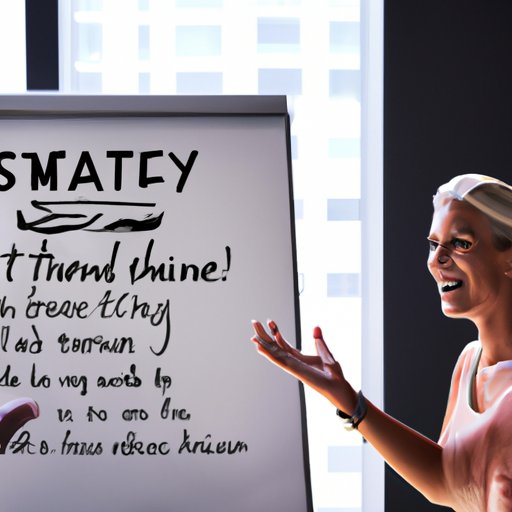Introduction
Have you ever wanted to be one of those people who can come up with the perfect witty response in any situation? Being able to respond with a clever quip or joke is an impressive skill that can help you stand out from the crowd. But being witty isn’t just about having a quick tongue; it also requires creativity, self-awareness, and an understanding of humor. While it may seem daunting at first, becoming wittier is possible with some practice.
But what does it mean to be witty? According to Oxford Languages, wit is “the ability to use words and ideas in a quick and inventive way to create humor.” It’s not just about making jokes; wit relies on finding the humorous side of any situation. The challenge is to be able to think quickly on your feet and come up with an appropriate response that is both funny and relevant.
In this article, we’ll explore some practical tips for becoming a witty person. We’ll look at how to practice witty comebacks and responses, as well as how to use books, comedies, and everyday situations as inspiration for your wit. We’ll also cover how to understand the elements of humor and how to take risks with humorous comments.
Practice Witty Comebacks and Responses in Conversations
The best way to become wittier is to practice responding to conversations with witty comebacks and responses. This can be intimidating at first, but you can become more comfortable with it by learning how to think quickly on your feet. To do this, try to come up with witty replies ahead of time. Brainstorm different ways to respond to common questions or statements so you’ll have something ready when the time comes.
It’s also important to listen carefully to what people are saying and pay attention to their tone and body language. This will give you clues as to what kind of response would be appropriate. For example, if someone says something sarcastic, you might want to respond in kind. If they say something serious, you may want to avoid cracking a joke.

Read Books and Watch Comedies to Learn Comedy Techniques
Reading books and watching comedies are great ways to get inspired and learn comedy techniques. Reading books that feature witty dialogue can help you gain an understanding of how to craft a joke or clever response. You can also watch stand-up comedians and analyze their humor. Pay attention to the comedic timing of their jokes and how they use wordplay and puns.
Comedies are another great source of inspiration. Watching sitcoms, stand-up specials, and movies can provide insight into various comedy styles and techniques. By observing how professional comedians deliver their jokes, you can start to develop your own style and figure out what works for you.
Pay Attention to the World Around You and Use it as Inspiration for Your Wit
Being witty isn’t just about being able to come up with clever one-liners; it’s also about being able to find the humor in everyday situations. Pay attention to the world around you and look for opportunities to make a joke out of it. Notice everyday occurrences that could be humorous and make puns out of objects or situations. Look for irony and satire in the news and current events.
You can also use other people’s conversations as inspiration for your wit. Listen for key words or phrases that can be used to make a joke. Create clever double entendres and be aware of subtle social cues. This requires practice and patience, but it’s an effective way to come up with witty remarks.

Develop an Understanding of Humor and Its Elements
Having an understanding of humor and its elements is essential for becoming wittier. Learning the basics of humor theory can help you understand why certain jokes work and others don’t. It’s also important to learn the different types of jokes, such as puns, sarcasm, irony, and satire. Appreciating different types of humor will also help you come up with clever responses.
It’s also helpful to read books and articles about humor. This can give you insights into the psychology of humor and why people find certain things funny. Understanding the science behind humor can help you come up with more creative jokes and responses.
Take Risks with Humorous Comments and Don’t Be Afraid to Fail
The only way to truly become wittier is to take risks and make mistakes. Don’t be afraid to try out new jokes and see what works. Taking a chance with a joke can be scary, but it’s the only way you’ll know if it’s successful. And if it’s not, don’t take it too seriously. Self-deprecating humor can be a great way to make light of a failed joke and move on.
It’s also important to remember that everyone has an off day. Don’t beat yourself up if your jokes don’t land or if you can’t come up with the perfect response. Just keep practicing and don’t be afraid to make mistakes.

Learn How to Tell Stories and Use Them to Enhance Your Wit
Storytelling is a great way to enhance your wit and make your jokes more engaging. Practice storytelling techniques, such as using exaggeration and hyperbole to make your stories more interesting. Utilize metaphors and analogies to make your points more vivid. With enough practice, you’ll be able to craft witty stories that leave your audience in stitches.
Conclusion
Becoming wittier takes time and effort, but it’s definitely achievable. By following the tips discussed in this article, you can learn how to think quickly on your feet and come up with clever jokes and responses. Practice witty comebacks and responses in conversations, read books and watch comedies for inspiration, and pay attention to the world around you for potential jokes. Develop an understanding of humor and its elements, take risks with humorous comments, and learn how to tell stories to enhance your wit.
With enough practice, you’ll be able to hone your wit and become the life of the party. All it takes is a little bit of dedication and a good sense of humor.
(Note: Is this article not meeting your expectations? Do you have knowledge or insights to share? Unlock new opportunities and expand your reach by joining our authors team. Click Registration to join us and share your expertise with our readers.)
